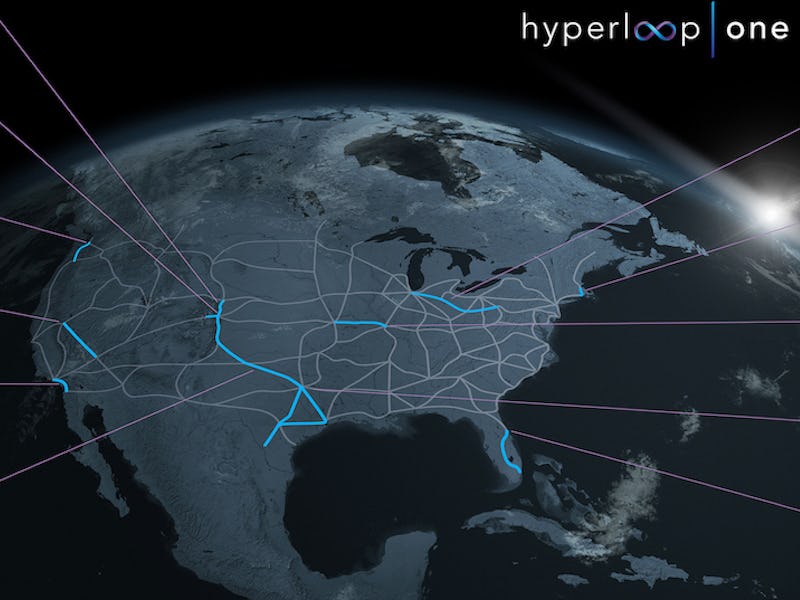Hyperloop One has taken the wraps off 11 proposed routes across the United States, finally revealing the company’s vision for connecting the country with the future of transportation. On Thursday, CEO Rob Lloyd introduced the 11 plans that made it through to the semifinal of the company’s global challenge, an international competition to find the most feasible starting point for a worldwide hyperloop system. The 11 American teams will join 24 other teams to compete for the chance to make their dream into reality.
The company is serious about building a hyperloop, Elon Musk’s concept of propelling pods at speeds of up to 700 miles per hour through a vacuum-sealed tube. The 35 teams in Hyperloop One’s competition will be whittled down to 12 finalists, going on to three eventual winners that will work with the company’s business and engineering teams to discuss development and financing. No operational commercial hyperloop routes exist yet, but this week Hyperloop One completed a 1,640-foot DevLoop test track in the Nevada desert.
“Hyperloop One is the only company in the world that’s building an operational system,” Lloyd told attendees at a media event in Washington, D.C. “This is happening now.”
At the company press conference, Hyperloop One displayed this map of a theoretical future network.
The company is taking a bold line on the benefits hyperloop could bring to the country. It claims an eventual hyperloop network could connect 80 percent of the national population with transit taking five hours or less. The routes submitted for the global challenge could reduce congestion on over 2,800 miles of roads.
“It’s not for the elite, it’s for every citizen, and we think we can transform people’s lives, economies, commerce, and logistics,” Lloyd said. “That’s the mission we’ve signed up for.”
Here are the 11 routes under consideration:
The Massachusetts route.
Massachusetts
This 64-mile route would connect Boston, to Somerset, then to Providence. It would serve 6.4 million people and enables trips from the cultural hub of Boston to the nearby Bristol County town of Somerset in just 5.3 minutes.
The Missouri route.
Missouri
Stretching over 240 miles, this would connect Kansas City to St. Louis, enabling trips from Missouri’s largest city to nearby Columbia in just 12.9 minutes.
The Texas triangle.
Texas
This route would stretch over a distance of 640 miles, connecting up the “Texas Triangle” megaregion, home to over 17 million people. This would enable trips from Dallas to Austin in just 19.5 minutes. By plane, the same trip currently takes around an hour.
The Florida route.
Florida
This route connects Miami to Orlando in just 24.7 minutes over a distance of 257 miles. By plane, that’s a trip that would normally take over an hour.
The Colorado route.
Colorado
Stretching across the Colorado front range over a distance of 242 miles, the track would enable trips from the capital city of Denver to Colorado Springs in just 6.2 minutes. By car, this would take an hour and 11 minutes.
The Rocky Mountain route.
Rocky Mountain
This route covers 360 miles and enables passengers to travel anywhere on the front range in less than 30 minutes. The team explained to Hyperloop one that 63 percent of Boulder County residents have been priced out of home ownership. A hyperloop would enable them to work in Boulder’s tech hub while commuting from Greeley, where median home prices are 60 percent lower.
The Pacific northwest route.
Pacific Northwest
This route covers 173 miles from Portland to Seattle in just 17.2 minutes, enabling employers like Boeing and Microsoft to access a labor pool ten times its size.
The Nevada route.
Nevada
This covers Reno to Las Vegas over 454 miles of track. It would serve 2.6 million people and enable trips between the two cities in just 42.3 minutes. By plane, that same journey would take about an hour and 20 minutes, and by car, you’re looking at around seven hours.
The route stretches from Los Angeles to San Diego.
West
This track would connect Los Angeles to San Diego over a distance of 121 miles, serving 16.6 million people with journeys between the two cities taking just 12.5 minutes.
The Cheyenne to Houston route.
Rocky Mountain Consortium
The biggie. Over a staggering 1,152 miles from Cheyenne to Houston, this route would serve 17.7 million people and connect up the Rocky Mountains. A journey that would normally take 17 hours by car, this would instead take just one hour and 45 minutes.
The Chicago-Pittsburgh route.
Midwest
Over a distance of 488 miles, this route would connect Columbus to Pittsburgh with a service that would take just 17.9 minutes. Normally, the journey would take nearly three hours by car.
